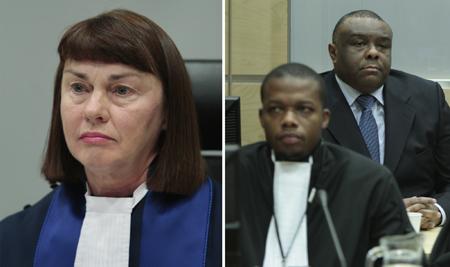The Appeals Chamber dismisses Mr Bemba’s appeal against the decision on the admissibility of his case

Situation: Central African Republic
Case: The Prosecutor v. Jean-Pierre Bemba Gombo
On Tuesday, 19 October, 2010, the Appeals Chamber of the International Criminal Court (ICC) confirmed the decision of Trial Chamber III entitled “Decision on the Admissibility and Abuse of Process Challenges” and dismissed Mr Jean-Pierre Bemba Gombo’s appeal against this decision. This judgment confirms that the case against Mr Bemba is admissible.
On 24 June, 2010, Trial Chamber III had dismissed the admissibility and abuse of process challenges, raised by the Defence. The latter filed an appeal against this decision on 28 June and submitted a document in support of his appeal, raising four grounds to appeal, on 26 July 2010.
Judge Anita Ušacka, Presiding Judge in this appeal, delivered an oral summary of the Appeals Chamber judgment. She recalled that article 17(1)(b) of the Rome Statute provides that a case is inadmissible before the ICC where the case has been investigated by a State which has jurisdiction over it, and the State has decided not to prosecute the person concerned, unless that decision resulted from the unwillingness or inability of the State genuinely to prosecute.
Judge Ušacka explained that the Appeals Chamber dismissed Mr Bemba’s ground of appeal in which he argued that Trial Chamber III erred in deciding that the case is admissible before the ICC, because it concluded that an order issued by the Bangui Regional Court’s Senior Investigating Judge on 16 September 2004 in the Central African Republic (CAR), did not constitute a ‘decision not to prosecute’ within the meaning of article 17 (1) (b) of the Statute. This Order had dismissed the charges against Mr Bemba, which concerned the events that now form the basis of the charges against him before the ICC. Judge Ušacka summarized the procedural history of the proceedings against Mr Bemba before the Central African courts, and indicated that the Court of Appeals and the Court of Cassation in Bangui (CAR) expressly reversed the Senior Investigating Judge’s Order, upheld the charges against Mr Bemba, and ruled that the case against Mr Bemba should be referred by the competent authorities in the Central African Republic to the ICC. O n 21 December, 2004, the Government of the Central African Republic referred to the ICC the crimes within the jurisdiction of the Court committed anywhere on its territory since 1 July 2002.
The Presiding Judge explained that the Order of the Senior Investigating Judge was not a “decision not to prosecute”, within the meaning of article 17(1)(b) of the Rome Statute, because it was not the final decision in the case before the Central African Republic courts. She also underlined that the Appeals Chamber has previously held on 25 September, 2009, in a judgment also relating to the admissibility of the case in the Prosecutor v. Germain Katanga and Mathieu Ngudjolo Chui, that a “decision not to prosecute” does not cover decisions to close judicial proceedings in order to refer the matter to the International Criminal Court.
Judge Ušacka clarified that the question as to whether the decision resulted from the unwillingness or inability of the State genuinely to prosecute only arises once it has been established that there was a “decision not to prosecute”. Since there was no ”decision not to prosecute” Mr Bemba before the Central African authorities, the Appeals Chamber would not consider Mr Bemba’s arguments that the Trial Chamber erred in deciding that the Central African Republic was unable genuinely to prosecute.
Finally, the Appeals Chamber also dismissed Mr Bemba’s arguments that Trial Chamber III erred in rejecting his request to provide evidence from an expert on the application of the law of the Central African Republic and in deciding that his submissions made before the courts of the Central African Republic in April 2010 constituted an “abuse of this court’s process”. The Presiding Judge recalled that the Appeals Chamber has previously held, in a judgment also relating to the admissibility of the case in the Prosecutor v. Joseph Kony, et. al., that at a minimum the appellant must set out not only an alleged error in the appeal, but also indicate, with sufficient precision, how this error would have materially affected the impugned decision. “Mr Bemba does not advance any arguments […] to indicate how the outcome of the Impugned Decision would have been different” Judge Ušacka stated in her oral summary of the Appeals Chamber judgment.
Mr Jean-Pierre Bemba Gombo is alleged to be criminally responsible for having effectively acted as a military commander within the meaning of article 28(a) of the Rome Statute for two crimes against humanity (murder and rape) and three war crimes (murder, rape and pillaging) allegedly committed in the territory of the Central African Republic during the period approximately between 26 October, 2002 and 15 March, 2003. Trial Chamber III is to schedule the date of the Trial’s opening.
For further information, please contact Fadi El Abdallah, Associate Legal Outreach Officer, on +31 (0)70 515-9152 or at [email protected]
The ICC’s activities can also be followed through YouTube and Twitter